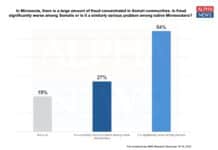A pair of Republican state legislators say a book and film at the center of a defamation lawsuit against Alpha News are exactly the types of speech that are protected under a recently passed law that received bipartisan support in the Minnesota Legislature.
Several months ago, Alpha News was among a list of entities sued for defamation by Minneapolis Police Department (MPD) Assistant Chief Katie Blackwell.
In her lawsuit, Blackwell alleged that testimony she delivered at former MPD officer Derek Chauvin’s criminal trial was manipulated to portray her as a liar in the book “They’re Lying: The Media, the Left, and the Death of George Floyd,” and the movie “The Fall of Minneapolis.” Both of those projects were created by Alpha News reporter Liz Collin.
Earlier this week, attorneys for Alpha News filed a motion to dismiss the case with prejudice, saying that Collin’s statements concerning Blackwell were truthful. Dozens of former MPD officers and public officials have submitted affidavits which provide factual support to Alpha News’ motion to dismiss.
The motion was filed under the new Uniform Public Expression Protection Act (UPEPA). In conjunction with this motion, Minnesota Senate Minority Leader Mark Johnson, R-East Grand Fork, and State Rep. Harry Niska, R-Ramsey, submitted affidavits which said that the UPEPA was passed specifically to protect works such as Collin’s book and film.
The UPEPA is a new Minnesota law designed to prevent SLAPP lawsuits; the acronym stands for Strategic Lawsuit Against Public Participation. In short, SLAPP lawsuits are legal cases brought with the goal of stifling free speech and burdening critics with court proceedings.
“The purpose of the Uniform Public Expression Protection Act was to protect the right to speak freely on issues of public interest and concern, especially for journalists and nonprofits,” wrote Rep. Niska in his affidavit.
Unanimously passed in the Minnesota House of Representatives before being rolled into an omnibus bill, the UPEPA was signed into law by Gov. Tim Walz in May of 2024. The law allows those who are sued for defamation to seek expedited relief and requires the court to dismiss any lawsuit with prejudice if the UPEPA applies to that case.
Versions of the UPEPA have been passed in Hawaii, Kentucky, New Jersey, Oregon, Utah, Washington, and, most recently, Pennsylvania.
“The speech included in the book They’re Lying: The Media, the Left, and the Death of George Floyd and the movie The Fall of Minneapolis is exactly the type of speech the Uniform Public Expression Protection Act was meant to protect,” said Minority Leader Johnson.
Niska, who was a co-author of the UPEPA, included a statement in his affidavit to the same effect. Additionally, both legislators said that Collin’s book and film are “unequivocally” about issues of public concern such as policing, the criminal justice system, and trust in the media.
Referencing their roles as state legislators, Johnson and Niska also wrote that the speech at issue is the type of information that influences their work to protect free speech, support law enforcement, and promote trust in institutions.
In addition to these two affidavits, a pair of Republican members of Congress from Minnesota also signed declarations for the case: Rep. Brad Finstad and Rep. Michelle Fischbach.
Both members of Congress wrote that the film “influenced and reiterated my belief that taking government action to support the law enforcement community is a matter of grave public concern.”
Under UPEPA, if a defendant persuades a court to dismiss all, or a portion of, a plaintiff’s defamation lawsuit, the plaintiff must pay the defendant’s reasonable attorneys’ fees, court costs, and reasonable litigation expenses.
Following the introduction of Alpha News’ motion to dismiss, Blackwell’s legal team is required to file its response on or before Jan. 24. Alpha News has reached out to Blackwell’s attorney for comment. This story will be updated if a response is received.











